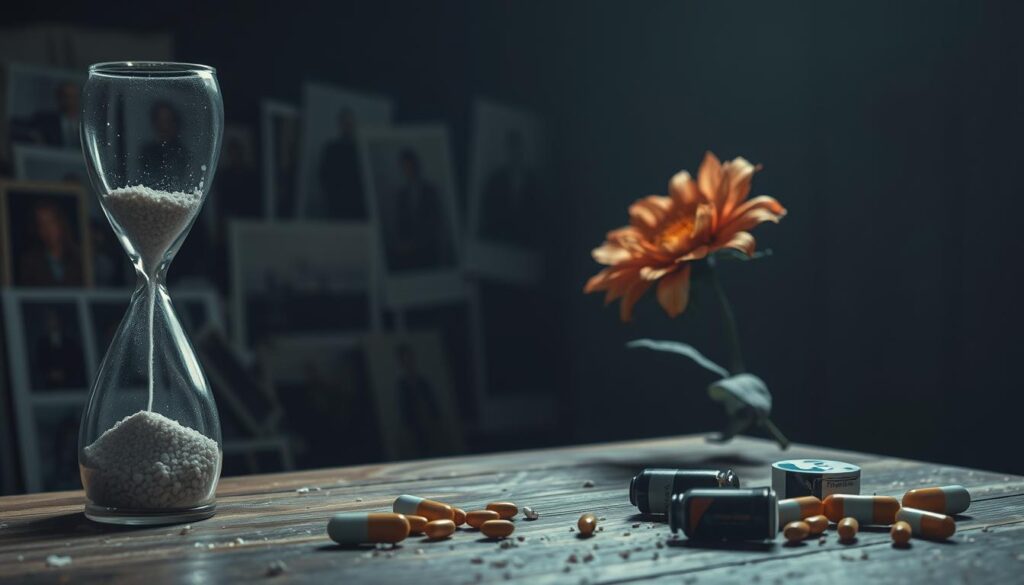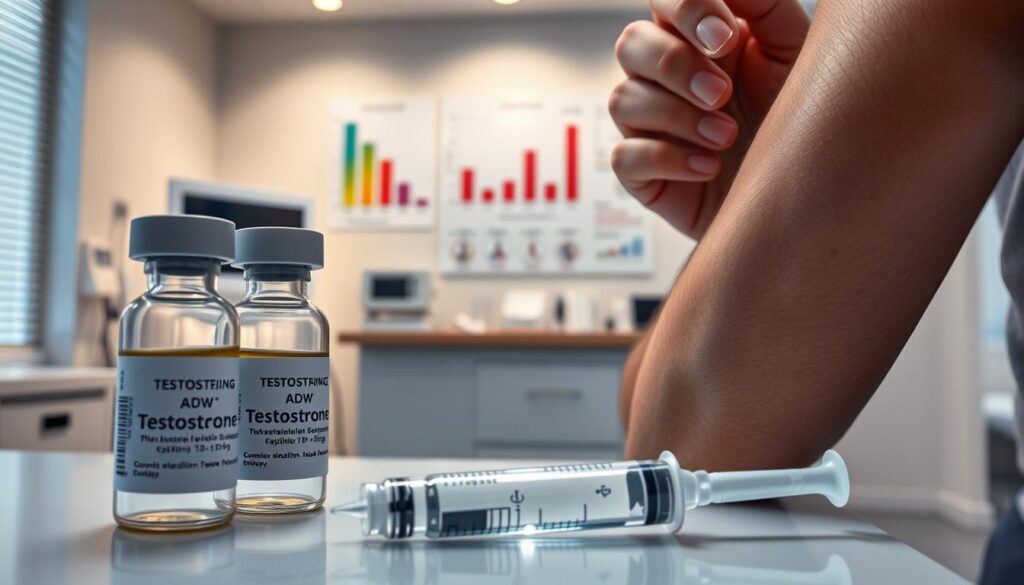As men get older, their sex drive often slows down. But keeping a healthy libido is key for feeling good and keeping relationships strong. We’ll look at why libido might drop in men over 40, like hormonal shifts and lifestyle choices. Our aim is to share solid, science-backed ways to boost sexual health and energy in middle-aged men.
Most men still have some interest in sex well into their 60s and 70s. But things like depression, stress, alcoholism, drug use, and fatigue can lower libido. Hormonal drops, especially in male hormones, can also reduce sex drive.
But there’s hope. Treatments like counseling, changing meds, and sometimes testosterone therapy can help. With the right help from a doctor, men can find out why their libido is low and get a plan to improve it.
Understanding Natural Libido Changes After 40
As men get older, their sex drive often changes. The main male sex hormone, testosterone, is key to sex. Testosterone levels drop by 1-2% each year after 30. This drop can make men less interested in sex over time.
Role of Testosterone in Aging Men
Testosterone helps with sex, like getting excited, getting an erection, and having an orgasm. When testosterone levels go down with age, men might feel less interested in sex. But, this is normal and doesn’t always mean there’s a health problem.
Normal vs. Concerning Changes in Sex Drive
It’s common for men to feel less interested in sex as they get older. This is just part of aging. But, if sex drive drops suddenly or if men have trouble getting an erection, it could be a sign of a bigger issue. It’s important to see a doctor if these changes happen quickly.
Impact of Hormonal Fluctuations
Other hormonal changes with age can also affect sex. Changes in estrogen and progesterone can mess with arousal, orgasm, and ejaculation. Knowing about these changes helps figure out what’s normal and what might need a doctor’s look.
| Age Range | Average Testosterone Levels |
|---|---|
| 18-29 years | 264-916 ng/dL |
| 30-39 years | 210-840 ng/dL |
| 40-49 years | 188-746 ng/dL |
| 50-59 years | 157-672 ng/dL |
| 60-69 years | 123-578 ng/dL |
Common Causes of Decreased Sexual Drive in Middle-Aged Men
As men get older, their sex drive often goes down. Several things can cause this, like low testosterone, chronic illnesses, and some medicines. Knowing why sex drive drops is key to fixing it and boosting sexual health.
Low testosterone is a big reason for less sex drive in older men. Testosterone levels drop with age, affecting 35% of men over 45. This imbalance can cause symptoms like less sex drive, weight gain, and tiredness.
Chronic illnesses like heart disease and diabetes can also lower sex drive. These conditions can mess with hormone levels and overall health, hurting libido.
Some medicines, like antidepressants and blood pressure drugs, can lower sex drive too. They can disrupt hormone levels and cause sexual side effects, including less desire for sex.
- Stress, anxiety, and substance abuse can also lower libido, especially in younger men.
- Being overweight, not exercising, and poor sleep can make sex drive drop too.
- Relationship problems and unresolved conflicts can also lower libido, affecting emotional closeness and desire.
By finding out why sex drive drops, men can take steps to improve it. This might mean changing lifestyle habits, getting medical help, or working on relationships. The goal is to tackle the main cause and improve overall sexual health.

Essential Lifestyle Factors for Libido Support
As men age, keeping a healthy libido can be tough. But, by focusing on key lifestyle factors, you can boost your sexual health. Let’s look at the main elements that can increase your sexual drive and overall intimate wellness.
Exercise and Physical Activity Guidelines
Regular exercise is crucial for a healthy libido. Studies show that exercise can improve sexual function, especially in those with sexual dysfunction. Aim for 150 minutes of moderate exercise or 75 minutes of vigorous exercise each week. Activities like brisk walking, swimming, and strength training can boost testosterone and improve sexual performance.
Sleep Quality and Sexual Health
Adequate sleep, typically 7-9 hours nightly, is key for hormonal balance and libido. Not getting enough sleep can mess with your hormones, leading to less sexual desire. Focus on good sleep habits, like a consistent bedtime routine and a relaxing sleep environment, to support your sexual wellness.
Stress Management Techniques
Stress can harm your sexual health. High cortisol levels, from chronic stress, can lower sexual desire. Using stress management techniques, like meditation, deep breathing, and counseling, can help reduce stress and its effects on libido.
By focusing on physical fitness, sleep hygiene, and stress reduction, you can take steps to support a healthy sexual life. Remember, a holistic approach to your well-being is essential for maintaining optimal libido and overall intimate wellness.
The Connection Between Mental Health and Sexual Wellness
Mental health issues like depression and anxiety can really affect how we feel about sex. They can make it hard to get excited about sex, have low libido, and struggle with reaching orgasm.
Studies show that mental health problems can mess with our sex lives. They can make it hard to want sex, get turned on, or feel satisfied. The DSM-5, a key guide for doctors, lists these issues as important to address.
Medicines for mental health, like SSRIs, can cause sexual problems. These problems are so common that they’re almost an epidemic. Doctors might not talk about sex with patients with psychosis because they worry it could make things worse.
Working on mental health through therapy, counseling, or meds can help a lot with sex. It’s key to talk openly with your partner about your mental health. This helps keep intimacy strong and tackles any sex problems that come up.
Knowing how mental health and sex are connected helps us take care of ourselves better. It makes our intimate moments better too.
| Mental Health Condition | Impact on Sexual Wellness |
|---|---|
| Depression |
|
| Anxiety |
|
| Schizophrenia |
|
Natural Remedies and Dietary Approaches for Sexual Health
As men age, keeping a healthy libido can be a challenge. Luckily, there are natural ways and diets that help. Eating nutrient-rich foods, taking specific supplements, and staying hydrated can boost sexual health. These steps can help men tackle libido issues and improve their intimate life.
Nutrient-Rich Foods for Hormonal Balance
Eating a balanced diet is key for hormonal balance and sexual health. Foods like oysters, leafy greens, and fatty fish are great. They offer zinc, omega-3s, and vitamin D, helping keep testosterone levels right. Adding these natural remedies to your dietary plan is a simple way to support your nutrition and libido.
Supplements and Their Effects
Some men might find that certain dietary supplements help their sexual health. DHEA, L-arginine, and ginseng might boost libido and erectile function. But, always talk to a healthcare provider before starting any supplements. They can guide you safely and effectively.
Hydration and Overall Wellness
Drinking enough water is often overlooked but is vital for overall health. It boosts energy, improves circulation, and supports bodily functions that help libido. Drinking plenty of water sets a good base for better sexual health and well-being.
By using these natural remedies, dietary supplements, and focusing on nutrition and hydration, men can support their sexual health. This helps them navigate aging changes and improve their intimate experiences.
Medical Interventions and Treatment Options
For men with low libido, medical help can be a good solution. Testosterone replacement therapy (TRT) is helpful for those with low testosterone. It can boost sexual desire and improve sexual function.
Also, erectile dysfunction (ED) medications like sildenafil (Viagra), vardenafil (Levitra), and tadalafil (Cialis) can help. These drugs improve blood flow to the penis, leading to stronger erections.
It’s key to treat medical issues that lower libido. Problems like sleep apnea, depression, and heart disease can harm sexual health. Fixing these issues can help improve sex drive.
Seeing a healthcare professional is crucial to find the right treatment. They will do tests to find the cause of low libido. Then, they can create a treatment plan that works.
| Treatment Option | Description |
|---|---|
| Testosterone Replacement Therapy (TRT) | Hormone therapy to restore normal testosterone levels in men with clinically low testosterone |
| Erectile Dysfunction Medications | Medications like sildenafil (Viagra), vardenafil (Levitra), and tadalafil (Cialis) to improve erectile function |
| Treat Underlying Conditions | Address medical issues like sleep apnea, depression, and cardiovascular disease that can impact sexual health |

Men can tackle low libido by addressing physical and mental health. Always talk to a healthcare professional to find the best treatments.
Building Intimate Relationships After 40
As we get older, our sex lives change. But, we can keep our relationships strong by talking openly and focusing on emotional connection. Even if our desire for sex might decrease, we can still feel close to our partners.
Communication Strategies with Partners
Talking about what you want and need is key. Be open about your feelings and listen to your partner. Trying new things and adjusting to changes can make you both happier and closer.
Maintaining Emotional Connection
It’s not just about sex. Doing things together, sharing experiences, and spending quality time can make your bond stronger. Try new hobbies, go on trips, or just enjoy each other’s company. If you’re facing issues, couples or sex therapy can help.
| Relationship Intimacy Factors | Impact |
|---|---|
| Open Communication | Enhances understanding and adaptability in the relationship |
| Emotional Connection | Strengthens the bond and overall satisfaction |
| Shared Activities | Fosters a sense of togetherness and closeness |
| Professional Guidance | Provides support for addressing relationship and sexual challenges |
By focusing on relationship intimacy and sexual communication, we can keep our relationships strong as we age. It’s all about staying connected and open with each other.
Conclusion
Keeping a healthy libido as men age needs a whole-body approach. This includes physical, mental, and emotional health. Understanding changes in testosterone and other hormones helps men tackle low sex drive.
Healthy habits like exercise, good sleep, and managing stress are key. They help keep sex life strong. Also, talking openly with partners and taking care of mental health are vital for a good sex life.
Sexual wellness is key to overall health and happiness. By focusing on libido and sexual function, men can age well. Prioritizing sexual wellness and a holistic approach to healthy aging opens up a new chapter of life full of vitality and joy.










